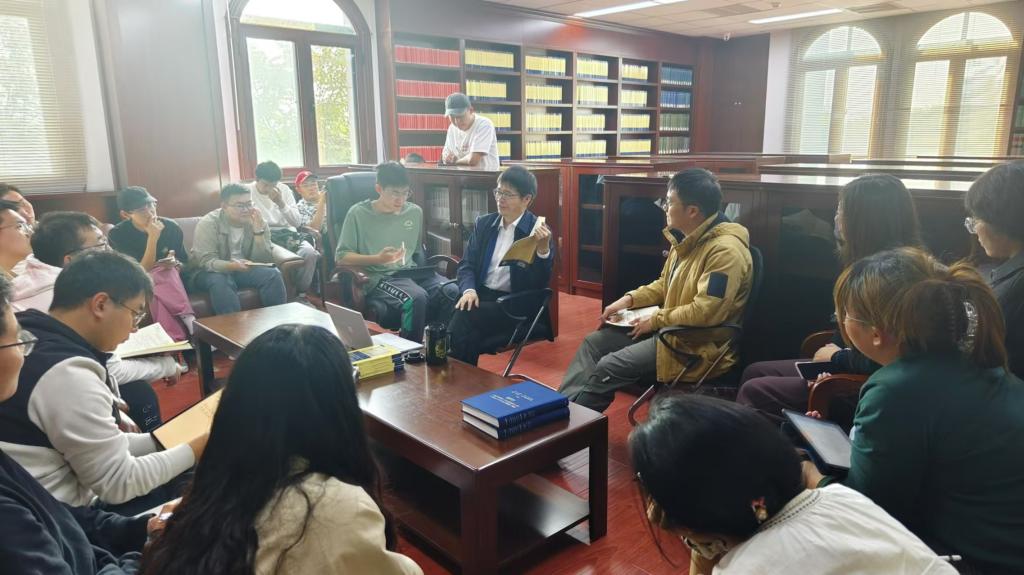On the afternoon of October 11, the library of IEC invited Professor Chen Lijun to give a lecture for master’s and doctoral students in world history on British manor court rolls.
Professor Chen began by explaining the basic functions, operations and academic value of medieval English manor courts. These rolls are crucial historical documents from medieval England, recording various aspects of manor administration, economic activities, legal proceedings, and social relations. They provide invaluable resources for studying medieval agriculture, economy, social structure, and legal systems. Prof. Chen emphasized that the time span of the manor court rolls is not limited to the medieval period. Some rolls from manors in Norfolk and Suffolk contain more records from the 17th to 19th centuries than from medieval times.
Prof. Chen used the library’s five-volume Court Rolls of the Manor of Wakefield as an example to explain the main content of the manor court rolls. The Wakefield Manor, as an ancient feudal manor in England, has a long history of court records that detail various cases handled by the manor court, such as land disputes and debt cases. Over time, these records accumulated and became essential resources for researching medieval English law and society. Recognizing the historical importance of these court records, the Yorkshire Archaeological Society began publishing them from 1901 and continued until 1945, producing five volumes covering the period from 1274 to 1331. The historical and academic significance of this collection has been widely acknowledged, and was listed in UNESCO’s UK Memory of the World Register.
According to Professor Chen, the main content of Court Rolls of the Manor of Wakefield can be divided into three categories: transactions related to landholding and transfers, lawsuits, and manor court trials. Transactions related to land account for approximately half of the records, making them among the most frequently documented cases in the rolls. Lawsuits are divided into collective and individual cases. In collective lawsuits, defendants were often prosecuted for violating manor customs or public welfare; in these cases, it is typically difficult to identify individual plaintiffs as officials like the manor steward or bailiff usually represented the manor collectively. For individual cases, Professor Chen indicated that the appendix at the end of the rolls lists all names mentioned. Names appearing multiple times are marked with separate page numbers, allowing researchers to trace cases and individuals within the records. Professor Chen encouraged students to focus on these highly active individuals, as compiling and analyzing unexplored cases involving such figures could provide an interesting research direction for graduate students.
Regarding the trials of the court, Professor Chen used specific cases to illustrate how to utilize and interpret content from rolls in research. First, he guided students through cases related to “wager of law,” revealing how medieval courts transitioned from wager of law to jury trials. He also analyzed cases in the Court Rolls of Manor of Wakefield involving women being fined for brewing beer. Professor Chen encouraged students to engage in analysis and discussion by examining the phenomenon of women repeatedly appearing in court to pay fines for brewing. His interpretation provided lively guidance on how to analyze historical sources and how to write historical research papers. Professor Chen also introduced the manor records database established by Lancaster University, noting that scholars in China have not yet fully utilized or explored British manor rolls.
In addition, Professor Chen suggested that students could enhance their research on manor court rolls by consulting other archival collections from the library of IEC, such as Victoria County History,Rolls of Medieval Parliaments of England, and Statutes of the Realm. For example, some cases in the manor court rolls related to royal charters, the texts of which can be found in Statutes of the Realm, providing a more comprehensive interpretation of the court rolls. Professor Chen emphasized that historical research should aim to find, read, and use primary archives and firsthand sources as much as possible, rather than relying solely on secondary references cited by other scholars in their papers or books.
After browsing parts of the original court roll texts, students then engaged in discussions with Professor Chen based on their own research interests and directions.


